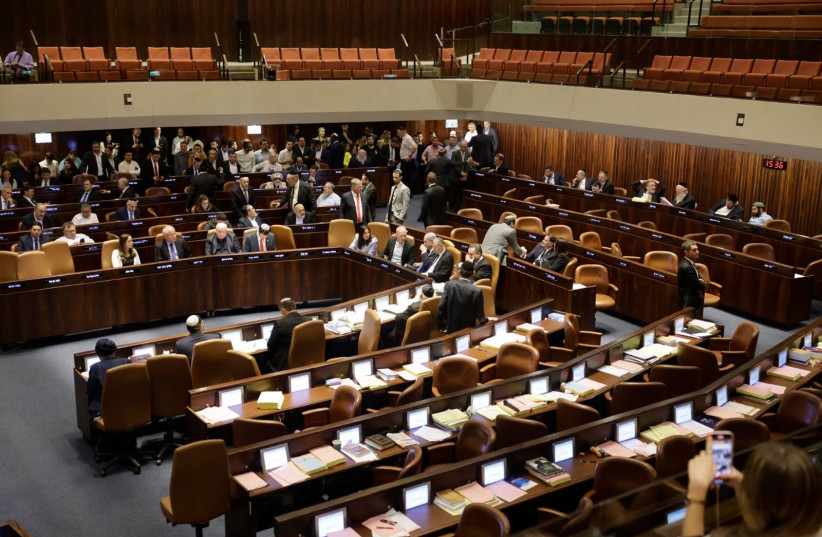The Knesset's summer term effectively ended on Monday afternoon when the Law to Cancel the Reasonableness Standard passed its final vote.
There were a number of additional bills, some of them quite important, but many of which received support across the aisle. Sunday is officially the summer term's last day. The plenum will convene to tie up a few loose ends and then Israel's legislature will go into snooze mode until October 15, after the holidays.
The social upheaval, pressure from protestors, the US president, the opposition, and within the coalition reached a climax on Monday. Then the bill passed, and the enormous balloon of pressure deflated quickly. Protestors folded up their tents at Sacher Park and headed home. The US administration issued a two-word response. Prime Minister Benjamin Netanyahu made a short statement. The opposition leaders made ashen-faced statements of their own, and that was it.
The backlash began immediately. Tuesday included special financial warnings from Moody's, Citi Bank, and Stanley Morgan. United Torah Judaism proposed a bill to equate Torah students to IDF soldiers, and the opposition and parts of the coalition erupted with criticism. A number of appeals were filed to the Supreme Court.
But Tuesday's backlash was muted compared to the intensity of the days that preceded it. And on Wednesday, other than conciliatory statements regarding unity on the eve of the Tisha B'av fast. On all sides, Israelis seem to be licking their wounds with a heavy heart, and asking themselves how we got here and what the future has in store.

Indeed, what does the long summer have in store?
What it does not have in store, at least for the next few weeks, is dialogue between the coalition and opposition.
During the desperate last-minute attempts to reach a compromise on Monday, opposition leader MK Yair Lapid demanded a 12-month commitment, anchored in law, not to pass any other judicial reform bills without consensus. Gantz, uncharacteristically, took a harder stance than Lapid and conditioned his support on there not being any more one-sided legislation whatsoever.
Justice Minister Yariv Levin would not hear of it. He insisted on having the ability to continue with the legislation during the next term. He and National Security Minister Itamar Ben-Gvir also warned Netanyahu that if he decides to change the wording of the bill without the opposition's consent, they will leave the government. The differences between the sides were insurmountable, and the bill passed as is.
Netanyahu in his statement, as a form of goodwill gesture, said that he was willing to commit not to pass one-sided legislation until the end of November. However, the coalition in the winter term is likely to focus first on a new haredi conscription bill, and a judicial reform bill is unlikely to pass by the end of November irrespectively.
The sweet talk on Tisha B'av eve does not conceal the fact that despite warnings by economists and the military, despite sustained opposition from a large segment of the population, and despite the president and eventually opposition nearly begging the coalition to water down the bill, the prime minister decided to go ahead with it.
Furthermore, the prime minister never committed, to the citizens of Israel, in Hebrew, that the legislation will pass by consensus only. On the contrary - his attempt to delay the formation of the Judicial Selection Committee and agreement to enter a clause into the Reasonableness Law that could block the Supreme Court from forcing Levin to convene the committee, indicate that an alteration to the committee's makeup – which is what caused the first climax of protests in March – is still on the table. In addition, many of his ministers are saying openly that the legislation will continue.
Lapid and Gantz are highly unlikely to pay a political price and reenter talks without some form of binding commitment that the talks will not be a waste of time. Netanyahu is highly unlikely to pay the political price of making such a commitment. The chance of any resumption of talks in the near future, therefore, is very low.
What should Israel expect?
The protest leaders announced in a statement that their strategy has shifted from "containment" to "attack," and that they are planning "new surprises." The government will likely attempt to keep a low profile and continue to call for talks without preconditions.
The High Court of Justice will take center stage in September when it is scheduled to hear cases against the coalition's Basic Law amendment from March that blocked the attorney-general or Supreme Court's ability to announce the prime minister "incapable" of serving in his position. It also will hear a case against Netanyahu for violating his legally-binding conflict-of-interest agreement by involving himself in judicial reforms. These cases could lead to a constitutional crisis and a deepening of the civil unrest and divisiveness.
But more than anything else, many Israelis are likely to hunker down indoors to avoid the heat, head abroad for their annual August vacations, send their kids off to school in September, celebrate the holidays, and then return in October refreshed and ready for the next battle and a continuation of what
